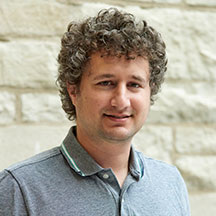Preparing MSR Students for Success
Matthew Elwin has a number of roles in Northwestern Engineering's Master of Science in Robotics (MSR) program, but all of them influence his primary goal, which is making the student experience as valuable as possible.

Put simply, his imprint can be found all over the program.
"Matt has extraordinary expertise in robotics, both very broad and very deep," MSR Director and professor Todd Murphey said. "He's comfortable with mathematical theory, and with the nuts and bolts of detailed implementation. That makes him well suited to teach students with a variety of backgrounds and a variety of interests."
Elwin teaches, advises, and mentors MSR students while also managing the program’s collection of roughly 50 robots — a tall task to ensure equipment is properly maintained and ready for educational use. Elwin also spearheads research on new robots in the marketplace and recommends what the program should obtain to give students cutting-edge robotics learning experiences that prepare them for industry work.
While Elwin’s role often takes place behind the scenes, it is pivotal to the success of students and the program. And it's one that Elwin enjoys.
“I take the robots manufacturers provide and put them in a form our students can use easily and efficiently,” Elwin said. “That way, they’re not spending all their time tweaking various settings on the robot just to get them to work. There is a time and a place for that skill, but sometimes our students need time to focus on exploring manipulation, machine learning, or computer vision. During these instances, it’s good for them to have a platform that just works.”
Exploring different types of robots and learning how to work with them is crucial for helping students understand what types of robots they like to work with and what it takes to succeed in the industry. It also exposes them to realities they might not have otherwise understood, Elwin said.
“You might just think industrial robots are boring; they just pick things up from one place and put them in another place,” he said, “but actually trying to implement that, you’ll see all the subtleties and difficulties with that task, which can be both challenging and inspiring.”
Elwin teaches Embedded Systems in Robotics and Sensing Navigation and Machine Learning, and also serves as an advisor for student projects across the program. As an instructor and mentor, he listens to the challenges and obstacles students are facing. From there, he provides a broader perspective about the problem and reassures students that with enough perseverance, they can accomplish what they set out to do.
That reassurance can sometimes be a challenge, as Elwin knows the fast pace of the program and students’ expansive project ideas sometimes collide.
"Many students come to me with incredible project ideas, wanting to solve many extremely difficult robotics problems," said Elwin, who advises independent projects and helps students explore a robotic interest of their choosing. "Part of my job is to help students focus on the important aspects of their ideas that can feasibly be solved in a given time-frame, while encouraging the ambitions of the students long-term.”
Although most projects in MSR are individual, which allows students to show off their unique skills, nobody works alone in the MSR program. Students have their classmates, who form a tight cohort.
They have faculty who teach classes and mentor students on individual projects, guiding them through the latest opportunities and challenges facing the world of robotics.
And they have Elwin, whose time is fully dedicated to the MSR program.
"Matt is the person who makes sure students have incredible project-based opportunities here at Northwestern," Murphey said. "Thanks to Matt, every student works with real robotic hardware and gets a unique experience adapted to their learning goals."

